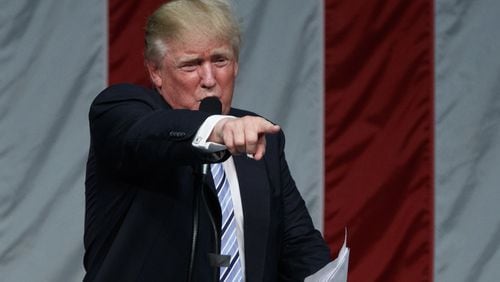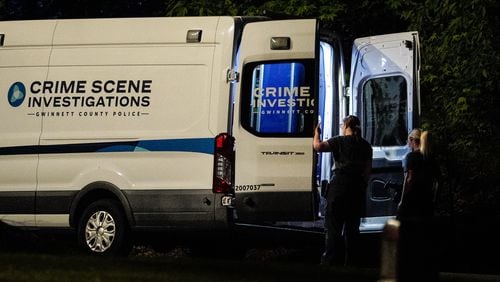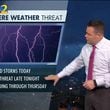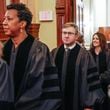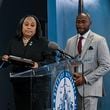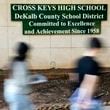83 days until vote
Wednesday marks 83 days until Americans vote in federal and state races on Nov. 8. All year, The Atlanta Journal-Constitution has brought you the key moments in those races, and it will continue to cover the campaign's main events, examine the issues and analyze candidates' finance reports until the last ballot is counted. You can follow the developments on the AJC's politics page at http://www.myajc.com/s/news/georgia-politics/ and in the Political Insider blog at http://www.myajc.com/s/news/political-insider/. You can also track our coverage on Twitter at https://twitter.com/GAPoliticsNews or Facebook at https://facebook.com/gapoliticsnewsnow.
Republican presidential nominee Donald Trump has called for an army of poll monitors to prevent a “rigged” election this November, but Georgia Democrats warn that the effort smacks of voter intimidation by a candidate known for rough tactics.
Georgia Republicans say there’s nothing unusual about having partisans monitoring elections and promised that they’d follow state election laws.
Trump's campaign has sought volunteers as he has increasingly talked about his concern that he will wind up losing a "rigged" election. The Washington Post reported late last week that Trump's campaign is planning a national network of attorneys to take poll monitors' calls and assess reported problems.
Georgia Republican U.S. Sen. David Perdue, a Trump backer, said there is no evidence that the election is being rigged, but that “the main thing here is that this election needs to have integrity.”
“This is a democracy, and if you can’t have open and honest elections, then what good is it?” he asked. “I think we’re going to have an election process that will have the full confidence of America and it will have the integrity it will need.”
Democrats aren’t so sure that’s what Trump’s call for volunteers is all about.
“This is what we know about Donald Trump — he has encouraged his followers to punch a protester at an event and has made inciting or condoning violence in his campaign commonplace,” said Rebecca DeHart, the executive director of the Georgia Democratic Party. “There’s no reason in the world to think he wouldn’t ask the same of his ‘poll observers.’ ”
Semantics aside, political parties in Georgia commonly use volunteer poll watchers as part of standard Election Day operations that often also include attorneys anyway.
State law allows monitors, as long as political parties submit names in advance to local and state officials. Local parties also train their volunteers on how to act. Among other restrictions, volunteers are not supposed to wear campaign material — such as campaign buttons or shirts — within a certain distance of a polling location.
Poll watchers in Georgia are essentially observers who keep an eye out for what they believe are violations of the state’s voting laws, and they can report the problem to the organization they represent. They are not supposed to communicate with voters trying to cast their ballot or record them, however, or interfere with poll workers conducting the election.
In the case of Trump, “his campaign has to register those (monitors) with our office, according to the legal timeline, and they need to be trained by his campaign as to the laws they need to follow,” said Richard Barron, the director of registration and elections in Fulton County.
Plus, they always are expected to “operate within Georgia’s election laws to guarantee safe and secure voting throughout the state,” said Adam Pipkin, the Georgia GOP’s executive director.
“We take every election seriously and appreciate all of our volunteers who work diligently to ensure that eligible Georgia voters are able to cast a ballot for the candidate(s) of their choice,” Pipkin said.
The concerns over Trump's plans, however, come as the U.S. Department of Justice recently announced a significant reduction in its use of federal election observers, something it said came as a consequence of a 2013 U. S. Supreme Court decision striking down a key provision in the national Voting Rights Act.
The court’s decision overturned a federal elections mandate known as “Section 5” that required jurisdictions with a history of racial discrimination in voting to seek approval from the Department of Justice or federal courts before making changes to voting rules.
Georgia is still one of 11 states certified by the department for federal observers in some local jurisdictions — 29 counties in all in the Peach State. Otherwise, the department has said it would concentrate observers in five other states where federal court rulings have prioritized monitoring: Alabama, Alaska, California, Louisiana and New York.
State House Minority Leader Stacey Abrams, D-Atlanta, a backer of Democratic presidential nominee Hillary Clinton, said Tuesday that Trump's encouragement of supporters to stop voter fraud represented a thinly veiled threat, especially in Georgia. The state is among the most watched by national civil rights groups over concerns of voter access to the polls during this presidential election.
Among the cases critics cite was a legal fight last year in Georgia’s Hancock County, where Sparta elections official Marion Warren said the county election board purged African-American voters. A federal court order reinstated many of those voters after groups including the Georgia NAACP and the national Lawyers’ Committee for Civil Rights Under Law sued.
“Given the sad history of Georgia and the Deep South interfering with or denying voting rights, we must be prepared for renewed obstruction,” Abrams said. “We should all be concerned about the effect his (Trump’s) menacing call will have on the ability of people of color to exercise their right to vote without fear.”
Elizabeth Poythress, the president of the nonpartisan League of Women Voters of Georgia, said there was nothing wrong with a party sending monitors to the polls. The league does the same, she said. But those monitors should be properly trained, she said. And supporters of any party need to understand the rules.
“I think anybody would be concerned about having mobs of people show up at a polling station — just having crowds at the polls could intimidate people,” Poythress said. But, she added, “there’s really nothing new about having poll watchers. It’s been a part of the Democratic process for a long time. It just depends on how it’s managed.”

